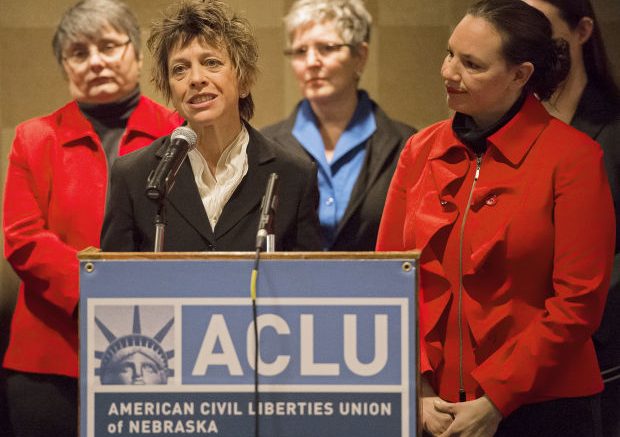Fifty years on the front lines.
At the half-century mark in a history that stretches back to striding out front in contesting the loyalty oath once demanded by Sen. Joe McCarthy, American Civil Liberties Union of Nebraska is moving closer now toward possible litigation to deal with Nebraska’s overcrowded prisons.
“We are beginning to fear that the political will may not be there” to resolve that challenge at the legislative or executive level, ACLU of Nebraska executive director Danielle Conrad says.
That would be the preferred outcome, Conrad said during an interview marking the organization’s anniversary year.
“In the next few months, we’ll make a final decision,” she said.
ACLU of Nebraska is not advocating construction of a new prison to address the overcrowding that has crammed prisoners into facilities that are bulging far beyond intended capacity, stoking tensions within the walls and increasing programming challenges.
Its eye is cast more on reducing prison population through additional sentencing reform and by funding adequate programming that provides alternative and ongoing community services for offenders while delivering adequate health care, including mental health care, as it prepares prisoners for safe release.
“More prisons is shortsighted,” Conrad said. “We need to get smart on crime.”
Non-violent offenders generally should be dealt with outside the prison system, she said, and adequate programming services should be provided to try to reduce the numbers that reoffend.
Conrad gives Scott Frakes, director of the Department of Correctional Services, high marks as a collaborative leader.
“I hope the governor supports him” with sufficient and timely resources as part of his budget recommendations to the Legislature, she said. Gov. Pete Ricketts will present his 2017-2019 budget proposal next year.
If ACLU of Nebraska decides to move ahead with a lawsuit, that would mark “one of the biggest cases in our history,” Conrad said.
Two cases have gone to the U.S. Supreme Court.
That can happen, she said, “when your client is the Constitution.”
The loyalty oath for public employees demanded by McCarthy, a Communist-hunting Wisconsin senator, during the Cold War confrontation with the Soviet Union, resurfaced in 2015 when several employees in the Hastings Public Schools complained that they were being required to sign the loyalty oath that remained unrepealed in Nebraska’s law books.
A letter from ACLU of Nebraska settled the issue without litigation by reminding school administrators that the 1951 Nebraska law had been voided by the Supreme Court ruling.
Sometimes a letter is all that it takes.
ACLU of Nebraska had been engaged in that issue almost from the organization’s beginning, challenging loyalty oaths for public employees on behalf of University of Nebraska employees in 1967.
The two Supreme Court decisions included a 1981 case challenging the use of taxpayer funds for a legislative chaplain in Nebraska and the printing of prayers, which ACLU lost, and a 1985 religious liberty case that it won.
In that case, a Nebraska woman objected to a photo of her being taken for a driver’s license because she believed that represented a “graven image” condemned by the Bible.
ACLU of Nebraska has been at the forefront of advocating for immigrant rights, voting rights, LGBT and transgender rights, reproductive rights and a host of civil liberties.
Part of the battle is to knock down “discriminatory barriers,” Conrad said, including recently assuring LGBT Nebraskans the right to be foster parents.
Some of those battles are waged in the Legislature; some in courtrooms. And victories have been won in both places.
The Legislature authorized driver’s licenses and occupational and professional licenses for so-called Dreamers, the children of illegal immigrants who arrived here as children and who now have a legal presence in the United States due to executive action by President Barack Obama.
Prenatal care for women who are illegal immigrants and their children was authorized by the Legislature earlier.
But Nebraska is considered “one of the most hostile states to abortion rights,” Conrad said, whereas it used to be viewed as “kind of middle of the road.”
Free speech, religious freedom, political association, discrimination in employment and wages all are on ACLU’s watch list.
In 2015, it was ACLU of Nebraska that came to the side of Larry Ball, the 77-year-old Navy veteran who had been barred from distributing Christian religious pamphlets outside Pinnacle Bank Arena.
“I see ACLU Nebraska as a watchdog for our civil liberties,” Sen. Laura Ebke of Crete said.
“We may not always agree politically, but it’s important to have a focus on those liberties because government generally has a tendency to forget about them.
“Somebody has to remind us and that’s good for all of us.”
Sen. Tommy Garrett of Bellevue said he’s “a strong proponent of what they do.”
ACLU of Nebraska “helped us a lot” in supporting his bill to legalize the use of medical cannabis in the state, he said. That bill ultimately was trapped by a filibuster as the 2016 legislative session approached adjournment.
“It’s been an absolute pleasure working with them,” Garrett said.
Prisons long have been on the ACLU watch list.
Concerns about mass incarceration began to emerge in the 1990s with increased imprisonment of drug offenders and imposition of lengthy sentences for non-violent offenders, Conrad said.
In 2015, ACLU of Nebraska helped draft reforms to curb reliance on solitary confinement and provide protections for prisoners with mental illness.
The organization worked with Frakes on the solitary confinement issue in a collaborative way, Conrad said, and is “grateful for his leadership.”
Ricketts “inherited a crisis” in the prison system when he was sworn in as governor in 2015, Conrad said. Without aggressive action now, she said, prison population will hover at 140 percent or more of capacity even five years from now.
“There is lack of meaningful access to health care and other programs and services now,” she said. “Reform doesn’t go far enough considering the gravity of the problem.
“It’s becoming increasingly clear that litigation might be the only remedy,” she said.
Conrad describes ACLU of Nebraska as “small, but mighty,” with four full-time staff members and a volunteer army. About 2,000 members pay dues to ACLU and Conrad estimates ACLU of Nebraska can count about 10,000 supporters, donors and activists.
Conrad is a former state senator from Lincoln, who served in the Legislature from 2007 to 2015 when she was term-limited out of office. She’s a graduate of the University of Nebraska College of Law.
Source: journalstar.com



